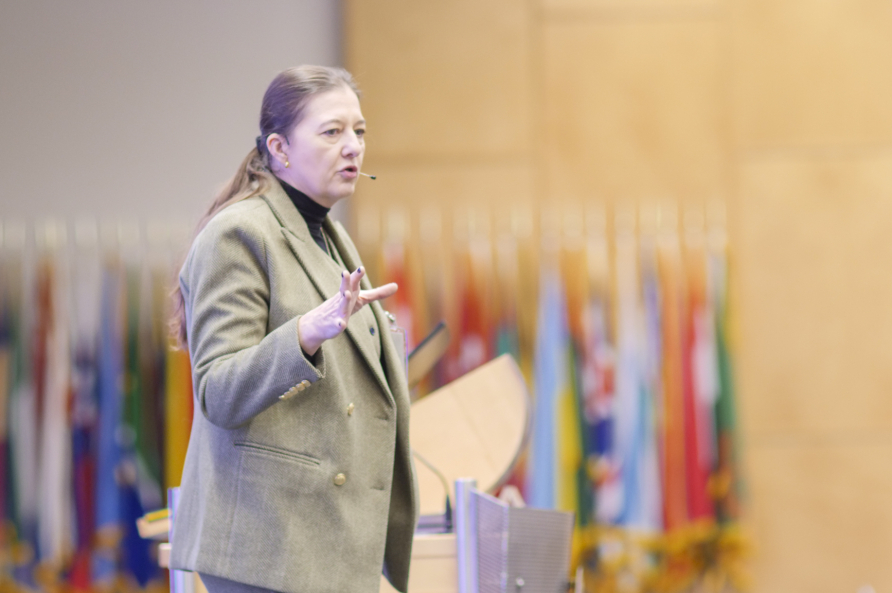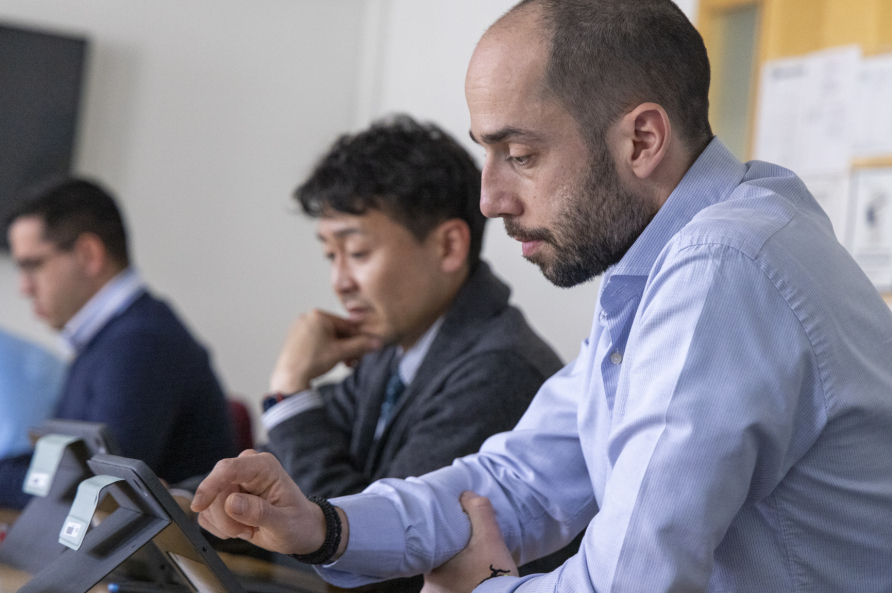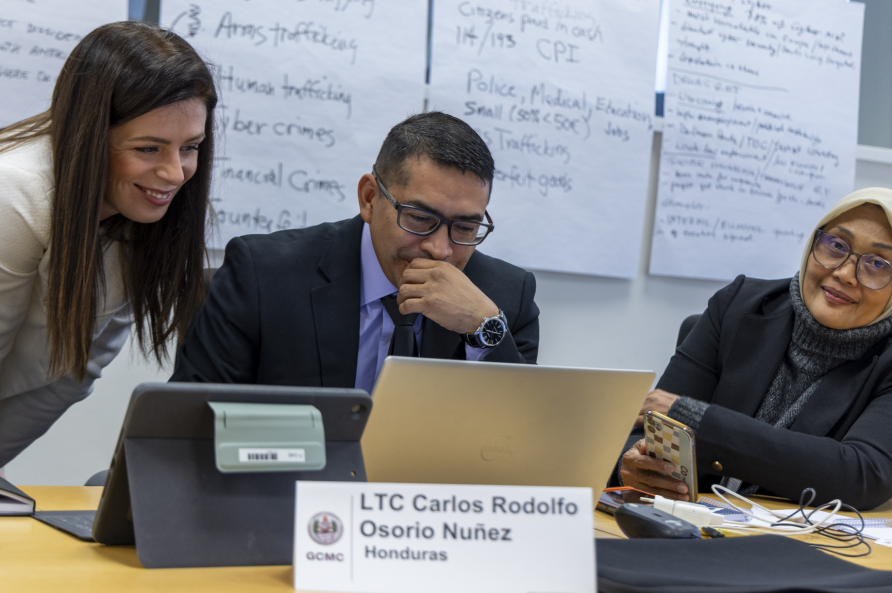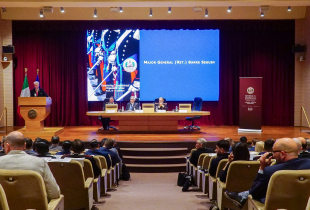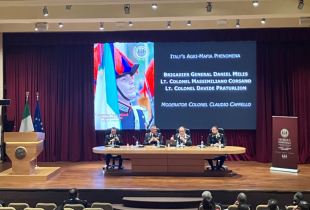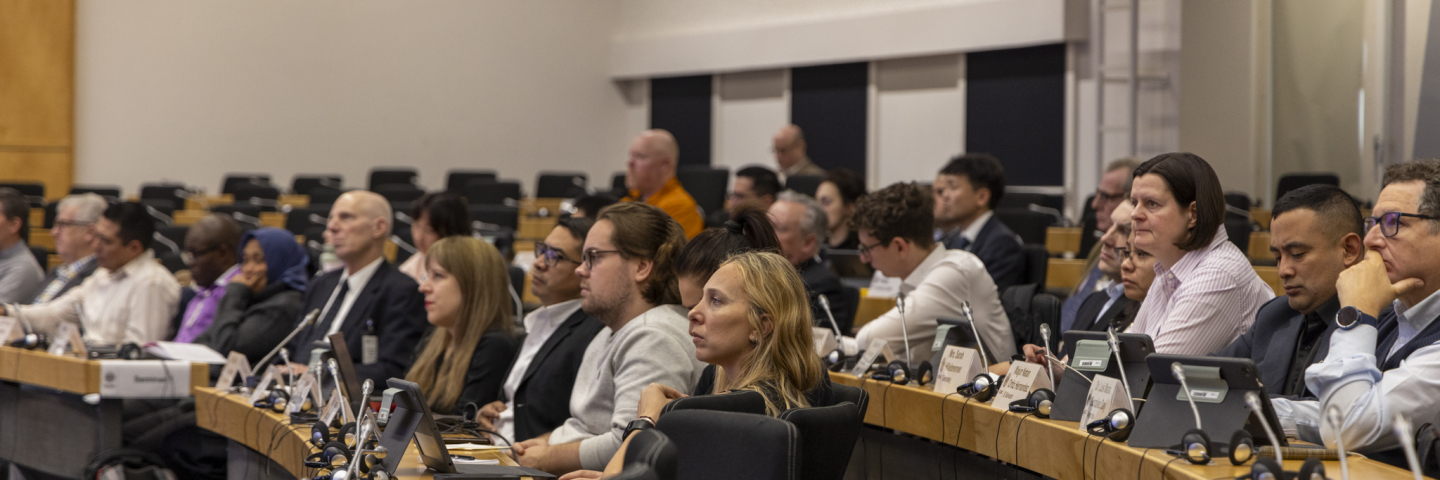
Countering Transnational Organized Crime Program Concludes
GARMISCH-PARTENKIRCHEN, Germany — Today marks the final day of the Countering Transnational Organized Crime program at the George C. Marshall Center, concluding three weeks of intensive discussions, expert-led analysis, and international collaboration.
The program brought together security professionals from around the world, focusing on the evolving threats posed by transnational criminal networks, and equipping participants with strategies to counter them. Throughout the course, attendees examined a range of illicit activities, from drug and human trafficking to cybercrime, financial fraud, and money laundering — highlighting the increasing sophistication of criminal enterprises and the critical role of international cooperation in combatting these threats.
“Transnational organized crime really seeks to undermine our common values,” said Marshall Center Director Barre Seguin in his opening remarks on Feb. 18. “It undermines our democracies, our freedoms, the opportunity to have good governance within our respective countries, to have rule of law, and in many cases, peace and security.”
A major theme of this year’s program was the growing influence of transnational organized crime and its expanding impact on global security. During a keynote lecture, Michael Miklaucic, a senior fellow at the Institute for National Strategic Studies at National Defense University, warned of the increasing resilience and adaptability of these networks. Unlike traditional criminal organizations, which typically focus on specific illicit markets, modern transnational criminal groups operate as autonomous, rapidly evolving ecosystems that challenge governmental efforts to curb their influence.
“As the world becomes wealthier, economic disparity continues to fuel grievances, pushing individuals toward illicit activities and strengthening criminal enterprises,” Miklaucic explained. “Transnational criminal organizations are not just a cold, not just a flu; they are a cancer. If they are not stopped, they metastasize and spread until they kill their host.”
The scale of the illicit economy, valued at up to $10 trillion, rivals legitimate industries in scope, with cybercrime, counterfeiting, and human trafficking driving its growth. Miklaucic pointed out that 83% of the world’s population lives in regions with high criminal activity, highlighting the urgent need for comprehensive, global countermeasures. He also emphasized that some states, such as North Korea, have fully integrated organized crime into their state functions, further complicating efforts to dismantle these networks.
“There is no limit to the creativity of these organizations,” Miklaucic said. “They are so adaptive, so able to generate revenue out of the widest and most diverse range of activities. It is virtually impossible to strangle them financially.” He cited Mexico’s ongoing struggle against cartels, which has left the government outgunned, outmanned, and outfinanced. This adaptability, he argued, makes dismantling these networks far more difficult than simply targeting individual actors.
Another focal point of CTOC discussions was the role of Chinese criminal organizations in the global illicit economy. Dr. Vanda Felbab-Brown, a senior fellow at the Brookings Institution, provided an in-depth analysis of how these networks exploit China’s political and economic landscape while operating across multiple illicit business lines.
“Over the past 20 years, we have seen a big growth in the activities of Chinese criminal groups in various domains, certainly in domains such as drug trafficking and wildlife trafficking, but also in other aspects. Money laundering is a prime example,” she said. Felbab-Brown explained that while China has the capacity to dismantle these networks, its actions are often selective.
“The Chinese government acts against them and often has the capacity to act with great effectiveness and great strength. But in some cases, the Chinese government is selective in what groups it acts against and might even be using certain criminal groups for state purposes.”
Participants also had the opportunity to examine firsthand the role of investigative journalism in exposing corruption and illicit financial networks. Investigative journalist Pavla Holcová and senior German public prosecutor Uwe Muhloff explored how organized crime has evolved into a transnational network where syndicates collaborate rather than compete.
“Instead of fighting each other, cartels now put money together, buy in bulk, and ship drugs in shared shipments,” Holcová explained. “If criminals are organized across borders, then those fighting them - law enforcement, journalists, prosecutors - must be, too.”
Muhloff warned that Europe’s drug smuggling routes are shifting from heavily policed ports like Rotterdam and Antwerp to less-prepared locations in Denmark, Norway, and Poland, where law enforcement struggles to combat large-scale trafficking. “We’ve seen what happened in the U.S. with 100,000 fentanyl-related deaths. It is only a matter of time before it arrives in Germany,” he said, adding that criminal organizations are taking advantage of gaps in financial oversight to launder illicit funds. “We estimate that 1 billion euros were laundered in Germany, but we could only recover a fraction of it.”
Another major topic covered in the program was the role of financial sanctions in combatting organized crime. Greg Gatjanis, associate director at the U.S. Department of Treasury’s Office of Global Targeting, discussed how targeted financial sanctions can be an effective tool when tied to clear policy objectives. Commander Javier de Valdenebro Tinaut of Spain’s Guardia Civil Criminal Intelligence Central Unit emphasized the growing convergence of organized crime and terrorism, stating that “illicit synthetic drugs are now as dangerous as weapons of mass destruction.”
As this year’s CTOC program concluded, Marshall Center Associate Director Sandra Oudkirk thanked participants for commitment to advancing security and stability in their home regions.
“You are now part of the Marshall Center alumni network, a global community dedicated to knowledge-sharing, collaboration, and collective security. I encourage you to stay connected, continue the dialogue, and leverage this network as you confront the challenges ahead,” she said. “I hope that your time at the Marshall Center has not only deepened your understanding of transnational organized crime, but has also provided you with new perspectives, practical tools, and lasting professional relationships.”
With more than 640 ongoing investigations into organized crime in Germany alone, and criminal networks continuing to evolve, the need for international cooperation has never been more urgent. CTOC remains a vital platform for security professionals to develop strategies to combat criminal enterprises, enhance intelligence-sharing, and build long-term security collaborations across borders.
